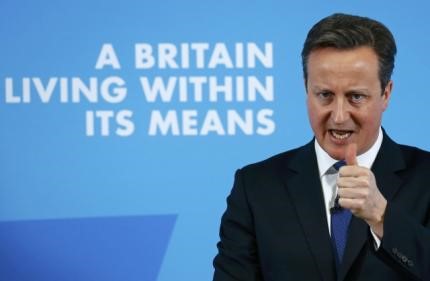By David Milliken
LONDON (Reuters) - Prime Minister David Cameron's Conservatives have their best chance in almost two decades to remould Britain's economy next week, in their first budget statement after an unexpectedly decisive election victory.
Freed from needing the support of their former coalition partners, the Liberal Democrats, Conservatives want to reduce borrowing faster this year and set out plans to cut the annual welfare bill by 12 billion pounds.
Since he took office in 2010, deficit reduction has been a central theme for Chancellor of the Exchequer George Osborne, who Cameron views as a potential successor. Now Osborne has a chance to make his mark with the first budget by a fully Conservative administration since November 1996.
Osborne is likely to take advantage of a growing economy and a new mandate for spending cuts to move faster towards his goal of running a budget surplus within three years.
"The outright victory of the Conservative party came as a surprise to everyone. Now that it has an absolute majority, it can restate its fiscal plans in undiluted form," said Societe Generale (PARIS:SOGN) economist Brian Hilliard.
Britain's public sector net debt exceeded 1.5 trillion pounds in May, more than 80 percent of GDP, and Osborne wants to lock in budget surpluses to bring this down rapidly, before Britain is hit by another financial crisis.
Britain's budget deficit in the year to March was 4.9 percent of GDP, larger than most other advanced economies. In the coalition's last budget, it was forecast to fall this year to 4.0 percent of GDP - equivalent to 75 billion pounds.
But a mix of strong tax revenue, lower borrowing costs and more spending cuts mean economists think the government's budget watchdog will lower this forecast by around 10 billion pounds.
This 'front-loading' reduces the pace of spending cuts Osborne will need to make in future years to hit his budget surplus target, which the Office for Budget Responsibility had likened to a "roller-coaster".
"BLOODY" BENEFIT CUTS?
The Conservative plans mean reducing the welfare spending for people under retirement age by 11 percent. Benefits in the firing line include housing subsidies and money paid to the unemployed, the disabled and low-earners.
"This is going to be bloody," Hilliard said.
Last month, tens of thousands of protesters marched through London in a rally against austerity.
Conservative lawmaker Mark Garnier said his party had been clear about the scale of welfare cuts at the election, though he hoped they would be phased in gradually.
"George Osborne, without a shadow of a doubt, has a mandate to do this, and given the election was just two months ago, he needs to get on with it," he said.
Part of the impact on those in work may be lessened by an increase in how much Britons can earn before paying income tax at the basic rate of 20 percent, after Cameron criticised the system of tax credits established before 2010.
But before the last election, the Conservatives gave a firmer commitment to raise the threshold at which a higher rate of 40 percent income tax kicks in to 50,000 pounds.
Leading Conservatives have also called on Osborne to scrap outright the top tax rate of 45 percent, paid by those earning more than 150,000 pounds.
The opposition Labour Party, which is choosing a new leader after its election defeat, has dropped its call for Osborne to raise this rate back to 50 percent.
Another question for Osborne is what to do about the 'bank levy' tax created after the financial crisis, which charges British-based banks a percentage of their global balance sheet.

Osborne raised it steadily in the last parliament, but now global banks such as HSBC (L:HSBA) are considering moving to a lower-tax jurisdiction.